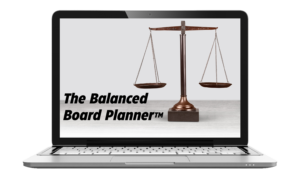Do you have a formal succession plan for your board of directors? A well-rounded board succession plan is crucial for ensuring the long-term success and sustainability of your organization. A succession plan outlines the process for selecting and transitioning new board members at your organization. Plus it serves as a vital tool for ensuring that your board comprises a diverse group of individuals with the necessary skills and expertise to guide your organization towards its goals.
Understand Board Competencies
A comprehensive succession plan should consider the various roles and responsibilities that board members fulfill within the organization. These include providing strategic direction, financial oversight, and legal and ethical governance. It should also take into account the different areas of expertise required for effective board governance, such as finance, marketing, operations, and human resources. Defining these competencies in the succession plan enables all members to assess their own competencies and identify areas for improvement. It’s important to define competencies in your plan so all members can understand their strengths and areas for improvement.
Anticipate Departures
A well-rounded board succession plan should consider the long-term needs of the organization. This means that your plan should take into account the potential for future board retirements. Plus, it should consider the need to have a pool of qualified candidates ready to fill these vacancies. By regularly reviewing and updating the plan, the organization will understand where they will have competency gaps when a board member leaves the board. Then, they can identify potential candidates that would fill those gaps and start developing relationships with them. This proactive approach ensures that the organization prepares for future transitions in board membership.
Diversity and Inclusion
Diversity and inclusivity are also key components of a well-rounded succession plan. A diverse and inclusive board brings a wide range of perspectives and experiences, which can lead to more effective decision-making and problem-solving. Regularly reviewing and updating the plan enables the organization to identify and recruit candidates from underrepresented groups. And, the organization can create an environment in which all board members feel valued and respected.
Leadership Succession
A well-rounded board succession plan should also take into account the need for a smooth transition of leadership. This is important because when a new board member is appointed, they may take time to get up to speed and become fully engaged in the organization’s work. Thus they cannot assume a leadership position right away. Regularly reviewing and updating the plan ensure that a clear process for onboarding new board members is established. This can help minimize disruption and ensure a seamless transition of leadership.
Emergency Succession
A well-rounded succession plan should also provide for the possibility of unexpected events, such as the sudden resignation or departure of a board member. This can be achieved by maintaining a pool of qualified candidates who can step in on short notice. That is why it’s important to identify your board competencies and evaluate each board member (and potential) on those competencies. If the organization needs a new member on short notice, having a qualified pool of candidates already available will be extremely helpful. Also, your plan should identify a clear process for filling vacancies quickly and efficiently. This will make the transition process smooth and seamless!
Conclusion
In conclusion, a well-rounded board succession plan is an essential tool for any organization. It ensures that the board is composed of a diverse group of individuals with the necessary skills and expertise to guide the organization towards its goals. A well-rounded plan takes into account the various roles and responsibilities that board members play within the organization, the different types of expertise that are necessary for the board to effectively govern the organization, the organization’s goals, objectives, and current circumstances, the potential for future board retirements, the need for a smooth transition of board members.


